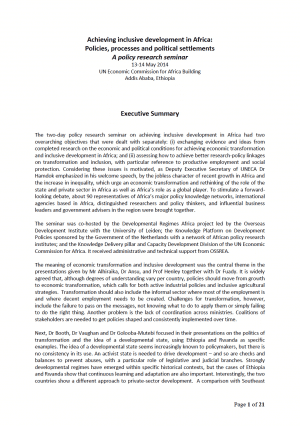
The policy research seminar “Achieving inclusive development in Africa: Politics, processes and political settlement” that was held in Addis Ababa on 13 and 14 May 2014 had two overarching objectives:
- Exchanging evidence and ideas from completed research on the economic and political conditions for achieving economic transformation and inclusive development in Africa;
- Assessing how to achieve better research-policy linkages on transformation and inclusion, with particular reference to productive employment and social protection.
To stimulate a forward-looking debate, about 90 representatives of Africa’s major policy knowledge networks, international agencies based in Africa, distinguished researchers and policy thinkers, and influential business leaders and government advisers in the region were brought together. The seminar was co-hosted by: the Developmental Regimes Africa project led by the Overseas Development Institute with the University of Leiden; the Knowledge Platform on Development Policies sponsored by the Government of the Netherlands with a network of African policy research institutes; and the Knowledge Delivery pillar and Capacity Development Division of the UN Economic Commission for Africa. It received administrative and technical support from OSSREA.
The presentations held during the Policy Research Seminar are available.
Highlights
- The jobless character of recent growth in Africa and the increase in inequality urge an economic transformation and rethinking of the role of the state and private sector in Africa as well as Africa’s role as a global player.
- Policies should move from growth to economic transformation, which calls for both active industrial policies and inclusive agricultural strategies. Transformation should also include the informal sector where most of the employment is and where decent employment needs to be created.
- The idea of a developmental state seems increasingly known to policymakers, but there is no consistency in its use. An activist state is needed to drive development – and so are checks and balances to prevent abuses, with a particular role of legislative and judicial branches.
- Special attention in employment strategies should be paid to youth and women employment; infrastructure and private sector development; levels of education; issues of good political governance; and the supply side to address mismatch or increase employment among other things. More coordination is needed between stakeholders and also better availability and use of data and research in job creation and policymaking.
- Knowledge about social protection is increasingly integrated in AU policy and also at the country level. Political will is essential to design and successfully implement social protection policies. The costs of these programmes have to be considered an investment. Research can play a significant role in influencing policy development, dialogue and implementation.
- The Agenda 2063 process, comprising a strategic framework and roadmap to develop Africa’s growth trajectory for the next 50 years, is highly relevant as it includes ways to address inequality. The strategic reorientation of UNECA towards serving knowledge needs for African policymakers demand sound and well-guided policy advice, support and training.
Recommendations to make policymaking on inclusive development more knowledge- and evidence-based:
- A better understanding is needed of knowledge flows: how do individual African countries move from policy towards implementation; and how to engage and communicate to policymakers (and how effective have the current channels been?).
- But also more knowledge is needed on inclusive development: capacity-building in political economy analysis; micro data; and systematic budgetary data and analysis for capacity development regarding transformational leadership backed by transformative institutions.









